Читать книгу The Seer of Slabsides - Sharp Dallas Lore - Страница 1
I
ОглавлениеThis title, "The Seer of Slabsides," does not quite fit John Burroughs – the Burroughs I knew. He was a see-er. A lover of nature, he watched the ways of bird and beast; a lover of life, he thought out and wrought out a serene human philosophy that made him teacher and interpreter of the simple and the near at hand rather than of such things as are hidden and far off. He was altogether human; a poet, not a prophet; a great lover of the earth, of his portion of it in New York State, and of everything and everybody dwelling there with him. He has added volumes to the area of New York State, and peopled them with immortal folk – little folk, bees, bluebirds, speckled trout, and wild strawberries. He was chiefly concerned with living at Slabsides, or at Woodchuck Lodge, and with writing what he lived. He loved much, observed and interpreted much, speculated a little, but dreamed none at all. "The Lover of Woodchuck Lodge" I might have called him, rather than "The Seer of Slabsides."
Pietro, the sculptor, has made him resting upon a boulder, his arm across his forehead, as his eyes, shielded from the sun, peer steadily into the future and the faraway. I sat with the old naturalist on this same boulder. It was in October, and they laid him beside it the following April, on his eighty-fourth birthday. I watched him shield his eyes with his arm, as the sculptor has made him, and gaze far away over the valley to the rolling hills against the sky, where his look lingered, sadly, wearily, for a moment at their vaunting youth and beauty; then coming instantly back to the field below us, he said: "This field is as full of woodchucks as it was eighty years ago. I caught one right here yesterday. How eternally interesting life is! I've studied the woodchuck all my life, and there's no getting to the bottom of him."
He knew, as I knew, that he might never rest against this rock again. He had played upon it as a child. He now sleeps beside it. But so interesting was the simplest, the most familiar thing to him, that the long, long twilight, already filling the valley and creeping up toward him, still gave him a chance, as we sat there, to watch the woodchuck slipping from his burrow. Had I been the sculptor, I should have made the old naturalist lying flat on the round of that rock, his white beard a patch of lichen, his eyes peering from under his slouch hat over the top of the boulder at something near at hand – at the woodchuck feeding below in the pasture.
He was the simplest man I ever knew, simpler than a child; for children are often self-conscious and uninterested, whereas Burroughs's interest and curiosity grew with the years, and his directness, his spontaneity, his instant pleasure and his constant joy in living, his utter naturalness and naïveté amounted to genius. They were his genius – and a stumbling-block to many a reader. Similia similibus curantur, or a thief to catch a thief, as we say; and it certainly requires such a degree of simplicity to understand Burroughs as few of us possess.
Not every author improves upon personal acquaintance, but an actual visit with Burroughs seems almost necessary for the right approach to his books. Matter and manner, the virtues and faults of his writings, the very things he did not write about, are all explained in the presence of a man of eighty-three who brings home a woodchuck from the field for dinner, and saves its pelt for a winter coat. And with me at dinner that day were other guests, a lover of Whitman from Bolton, England, a distinguished American artist, and others.
The country road, hardly more than a farm lane, shies up close to Woodchuck Lodge as it goes by. Here on the vine-grown porch was the cot of the old naturalist, as close to the road as it could get. Burroughs loved those remote ancestral hills, and all the little folk who inhabitated them with him. He was as retiring and shy as a song sparrow – who nests in the bushes, and sings from the fence stake. No man loved his fellow-man more than Burroughs. Here in his cot he could watch the stars come out upon the mountain-tops and see the fires of dawn kindle where the stars had shone, and here, too, he could see every passer-by and, without rising, for he had need to rest, he could reach out a hand of welcome to all who stopped on their journey past.
And everybody stopped. If he had no fresh woodchuck to serve them, he would have one out of a can, for no less in his home than in his heart had he made provision for the coming guest. The stores of the village were far away, but there was no lack of canned woodchuck and hospitality in the Lodge. Few men have had more friends or a wider range of friends than Burroughs. And months later, as I sat looking over the strange medley of them gathered at his funeral, I wondered at them, and asked myself what was it in this simple, childlike man, this lover of the bluebird, of the earth on his breast and the sky on his back, that drew these great men and little children about him. He was elemental. He kept his soul. And through the press men crowded up to touch him, and the virtue that went out from him restored to them their souls – their bluebird with the earth on its breast and the sky, the blue sky, on its back.
